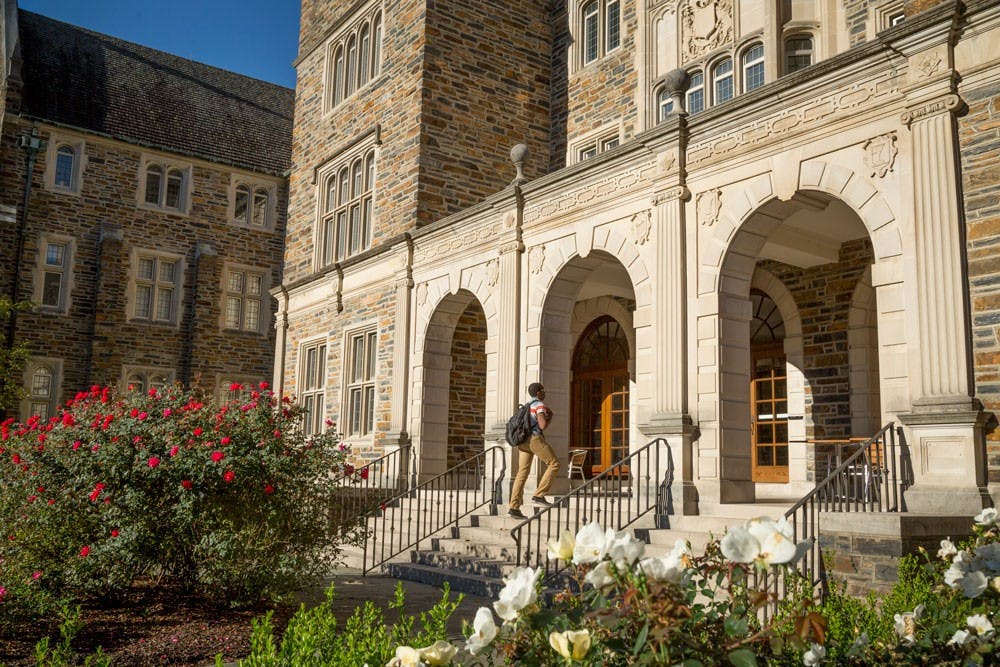Academic Council unanimously voted to approve an executive master of public affairs degree program in the Sanford School of Public Policy at its Thursday meeting, the last of the fall semester.
Council members also heard remarks from President Vincent Price about The Duke Endowment’s recent $100 million award to the University, discussed administrative hurdles to research and listened to changes to the external review process for departments and programs.
$100 million award from The Duke Endowment
President Vincent Price opened the meeting by thanking The Duke Endowment for its $100 million award to the University in honor of its centennial. The award is the single largest in Duke’s history.
The award will fund Duke’s new financial aid initiative, which provides full tuition scholarships for students from the Carolinas with family incomes under $150,000. Price hopes that the program will add diversity to the University’s incoming undergraduate class.
Funding will also be directed towards the graduate schools to support students who were undergraduates at historically Black colleges and universities. Additional funds will go towards supporting experiential learning programs and renovating various buildings on West Campus.
Approval of the new executive master of public affairs degree program
Council members unanimously voted to approve the creation of an executive master of public affairs degree in the Sanford School of Public Policy. The request will go to the Board of Trustees for final approval.
The Council heard a proposal for the degree during its Nov. 16 meeting. The new program will serve mid-career professionals with seven to 10 years of work experience and use a hybrid teaching model with both in-person and online instruction.
Administrative research concerns
The Council then heard from Jennifer Lodge, vice president for research and innovation, who responded to questions about support for faculty research that council members proposed after their September meeting.
Lodge said that there is a project underway to digitalize the Institutional Review Board process, which is currently conducted on paper. She also addressed concerns about contracting speed and efficiency, and said that the Office of Research Support is under review for staffing and workflow improvements.
Faculty members’ primary concern was an increase in administrative tasks not directly related to their research or teaching, especially when conducting international research.
“I know a lot of us in this room have been doing research for a long time, and I know we've all seen an increase in what we're being asked to do over the last decade,” Lodge said.
Lodge attributed the increased administrative burden to federal regulations that have “become more and more onerous.”
“What we can do here at Duke is try to understand what those regulations are and try to make it as easy for the faculty to comply with those regulations,” she added.
Some faculty members pushed back, arguing that Duke’s strict interpretation of federal regulations is to blame for researchers’ administrative hurdles.
“Duke administratively is way more rigid and conservative in their interpretation of federal rules than many, many of our peers,” said Harvey Cohen, Walter Kempner distinguished professor of medicine.
Other faculty members echoed Cohen’s sentiments and said that graduate student research assistants are unduly impacted by the strict guidelines.
Lodge said that the University remains closely monitored by the National Institutes of Health as a result of a 2019 lawsuit settlement that dealt with allegations of scientific research misconduct.
Going forward, Lodge said the Office for Research & Innovation will help investigators better understand and navigate research and administration support, introduce flexibility in proposal submission times and address the unique challenges for international research and decrease delays and coordination gaps through partnership with non-research administration.
Changes to the external review process
Edward Balleisen, vice provost for interdisciplinary studies, spoke to the Council about changes to the Academic Program Committee’s external review process for departments and programs.
The APC advises the provost on university-wide academic issues and recommends the creation, termination or contraction of academic units.
Key changes include streamlining the framework for self-study, the addition of external peer review letters and the implementation of formal mid-cycle check-ins with the provost. Additionally, the review committee will include two external reviewers and one internal reviewer.
Primary oversight of the review process will also shift from the Graduate School to the Provost’s Office, with the Graduate School still serving as a partner.
Although council members applauded many of the long-awaited changes, some faculty members voiced concerns about the shift in primary oversight to the provost’s office.
"I like very much all of the streamlining, I have little worries about these couple of key features that take department insight out of the default procedure," said Joshua Sosin, associate professor of classical studies. "It's not asking for departments to shape their own review entirely — that's not compatible with the concept of review — but to share their insights ... in the field in which they are experts would be appropriate."
Get The Chronicle straight to your inbox
Signup for our weekly newsletter. Cancel at any time.
Mia Penner is a Trinity sophomore and an editor-at-large of The Chronicle's 119th volume.

